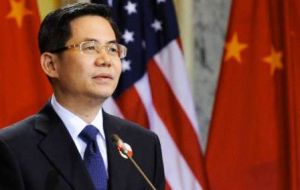MercoPress. South Atlantic News Agency
China protests US claims of cyber spying and warns of ‘harmed relations’
 Zheng told Baucus that the US attitude to Internet security was “overbearing and hypocritical”
Zheng told Baucus that the US attitude to Internet security was “overbearing and hypocritical” China has summoned the US ambassador who had accused five Chinese military officers of hacking into American companies to steal trade secrets, warning Washington it could take further action, the foreign ministry has said.
The US Ambassador to China, Max Baucus, met with Zheng Zeguang, assistant foreign minister, on Monday shortly after the United States charged the five Chinese, accusing them of hacking into American nuclear, metal and solar companies to steal trade secrets.
Zheng “protested” the actions by the United States, saying the indictment had seriously harmed relations between both countries, the foreign ministry said in a statement on its website.
Zheng told Baucus that depending on the development of the situation, China “will take further action on the so-called charges by the United States”.
It was the first criminal hacking charge that the United States has filed against specific foreign officials, and follows a steady increase in public criticism and private confrontation, including at a summit last year between US President Barack Obama and Chinese President Xi Jinping.
The indictment is likely to further roil relations between China and the United States. Besides cyber-hacking, Washington and Beijing have grappled over a range of issues, including human rights, trade disputes and China's growing military assertiveness overseas contested with its neighbors.
“The Chinese government and military and its associated personnel have never conducted or participated in the theft of trade secrets over the Internet,” the foreign ministry quoted Zheng as telling Baucus.
Zheng told Baucus that the US attitude to Internet security was “overbearing and hypocritical” and urged the United States to give China a clear explanation on reports that Washington has long spied on the Chinese government, businesses, universities and individuals.
The US Embassy to China spokesman, Nolan Barkhouse, confirmed the meeting but declined to provide more details.
China's Ambassador to the United States, Cui Tiankai, also “made solemn representations” to the State Department.
“The accusations that the United States has made against these Chinese officials are purely fictitious and extremely absurd,” Cui was quoted as saying by the state-run China News Service said.
China's defense ministry summoned the American military attaché to protest what they said were actions “that seriously violated norms governing international relations and for seriously slandering the image of the Chinese army”.
The angry reaction from Beijing is likely to be the first major test for Baucus, who arrived in Beijing in March, as he seeks to balance US interests with the desire for more economic cooperation with China.
China is the United States' biggest foreign creditor. As of February, China held 1.27 trillion dollars in US Treasury bonds, according to Treasury Department data.




Top Comments
Disclaimer & comment rules-

-

-

Read all commentsWith the number of issues that harm relations according to the Chinese government, it's a wonder they talk to anyone.
May 21st, 2014 - 07:25 am 0Agreed Anglo. Just about every other sentence out of their mouth is stating this or that will harm their relationship. They need a new script.
May 21st, 2014 - 09:09 am 0step 1) withdraw all the cash reserves are in the United States;
May 21st, 2014 - 09:43 am 0step 2) commercially isolate the Western countries;
step 3) isolating culturally Western countries;
step 4) establish a Confederation of emerging countries (Third World);
step 5) to block all communications with the rich and heavily indebted countries;
step 6) to end the linguistic colonialism in South America, founding the Brazilian language;
step 7) to create a compensation fund of emerging countries for the nationalization of foreign companies operating in strategic sectors;
Step 8) extinguish flights between rich and emerging countries;
Step 9) emerging countries abandon all multilateral organizations;
step 10) emerging countries founded their own multilateral organizations.
For a better world for everyone!
https://www.youtube.com/watch?v=xcV2NIviFA0&index=2&list=FLmXPTu1f8AdGlizWNiASx2A
Commenting for this story is now closed.
If you have a Facebook account, become a fan and comment on our Facebook Page!